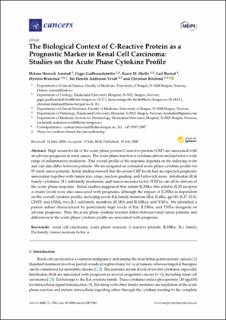The Biological Context of C-Reactive Protein as a Prognostic Marker in Renal Cell Carcinoma: Studies on the Acute Phase Cytokine Profile
Aarstad, Helene Hersvik; Gudbrandsdottir, Gigja; Hjelle, Karin; Bostad, Leif; Bruserud, Øystein; Tvedt, Tor Henrik Anderson; Beisland, Christian
Journal article, Peer reviewed
Published version

Åpne
Permanent lenke
https://hdl.handle.net/11250/2728841Utgivelsesdato
2020Metadata
Vis full innførselSamlinger
- Department of Clinical Science [2318]
- Registrations from Cristin [9791]
Sammendrag
High serum levels of the acute phase protein C-reactive protein (CRP) are associated with an adverse prognosis in renal cancer. The acute phase reaction is cytokine-driven and includes a wide range of inflammatory mediators. This overall profile of the response depends on the inducing event and can also differ between patients. We investigated an extended acute phase cytokine profile for 97 renal cancer patients. Initial studies showed that the serum CRP levels had an expected prognostic association together with tumor size, stage, nuclear grading, and Leibovich score. Interleukin (IL)6 family cytokines, IL1 subfamily mediators, and tumor necrosis factor (TNF)α can all be drivers of the acute phase response. Initial studies suggested that serum IL33Rα (the soluble IL33 receptor α chain) levels were also associated with prognosis, although the impact of IL33Rα is dependent on the overall cytokine profile, including seven IL6 family members (IL6, IL6Rα, gp130, IL27, IL31, CNTF, and OSM), two IL1 subfamily members (IL1RA and IL33Rα), and TNFα. We identified a patient subset characterized by particularly high levels of IL6, IL33Rα, and TNFα alongside an adverse prognosis. Thus, the acute phase cytokine reaction differs between renal cancer patients, and differences in the acute phase cytokine profile are associated with prognosis.
